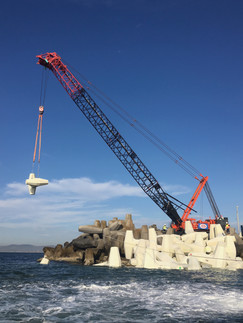What Makes Marine Construction Different from Land-Based Projects?
- GMC

- Jun 19, 2025
- 3 min read
Marine construction is a highly specialized field that goes beyond traditional building work on land. At Guerrini Marine Construction, we operate at the intersection of land and sea-handling complex projects like dredging, slipway construction, underwater concrete placement, and marine infrastructure development across South Africa.
If you're wondering how marine civil construction differs from land-based building, here’s a breakdown of the key differences and challenges that make this industry unique.
1. Constantly Changing Marine Environment
Unlike dry land, the marine construction environment is always in flux. Tides, waves, and currents create unpredictable conditions that impact safety, timing, and work procedures. At Guerrini Marine Construction, we:
Schedule construction tasks around tide charts and weather forecasts.
Adapt our methods based on water visibility for underwater inspections.
Use specialized marine construction equipment to maintain control in rough conditions.
This level of planning is essential for successful marine infrastructure projects.
2. Underwater Foundations Are Complex
Laying foundations on land is straightforward compared to what happens underwater. Many marine construction sites sit on soft seabeds, sand, or silt-not stable ground. We overcome this by:
Dredging to remove unsuitable substrate.
Installing piles or anchor blocks deep into the seabed.
Using underwater concrete that sets even in moving water.
We engineer every foundation to handle dynamic marine loads and long-term corrosion exposure.
3. Specialized Equipment & Commercial Divers
Marine civil engineering demands tools you won’t find on a land-based site. Guerrini Marine Construction deploys:
Floating platforms, cranes, and jack-up barges.
Subsea lifting equipment and winches.
Certified commercial divers for inspections, welding, and underwater installations.
Our integrated diving services mean faster response times and better control over underwater work.
4. Environmental Regulations & Compliance
Marine construction companies in South Africa operate under strict environmental rules. Permits from authorities like TNPA (Transnet National Ports Authority) or DEFF are often required. We help clients:
Complete Environmental Impact Assessments (EIAs).
Follow best practices to protect marine ecosystems.
Reduce water pollution, sediment disruption, and habitat loss.
At GMC
, we build responsibly—preserving the environment while delivering marine construction excellence.
5. Durability Against Salt, Corrosion & Wave Action
Saltwater is corrosive, wave energy is relentless, and marine growth like barnacles causes wear over time. That’s why:
We use marine-grade materials for all critical elements.
Our engineers apply protective coatings and cathodic protection systems.
We factor in life-cycle maintenance when designing long-term solutions.
Whether it’s a slipway, quay wall, or mooring block, we design for longevity.
Why Choose Guerrini Marine Construction?
At Guerrini Marine Construction, we bring decades of hands-on expertise and a deep understanding of coastal and underwater environments. We offer a full range of specialised marine construction services across South Africa, designed to meet the highest standards of safety, durability, and environmental compliance.
Our core service areas include:
Marine Infrastructure Construction: From jetties and quays to slipways and mooring systems, we design and build robust marine infrastructure tailored to your operational needs.
Coastal Protection Solutions: We protect coastlines from erosion and storm damage through engineered solutions like rock revetments, breakwaters, and seawalls.
Dredging Services: We perform maintenance and capital dredging to restore depth, improve water flow, and support port and aquaculture operations—always with a focus on efficiency and environmental care.
Underwater Civils: Our commercial diving teams and civil crews work together on underwater concreting, repairs, inspections, and installations in ports, harbours, and offshore environments.













Comments